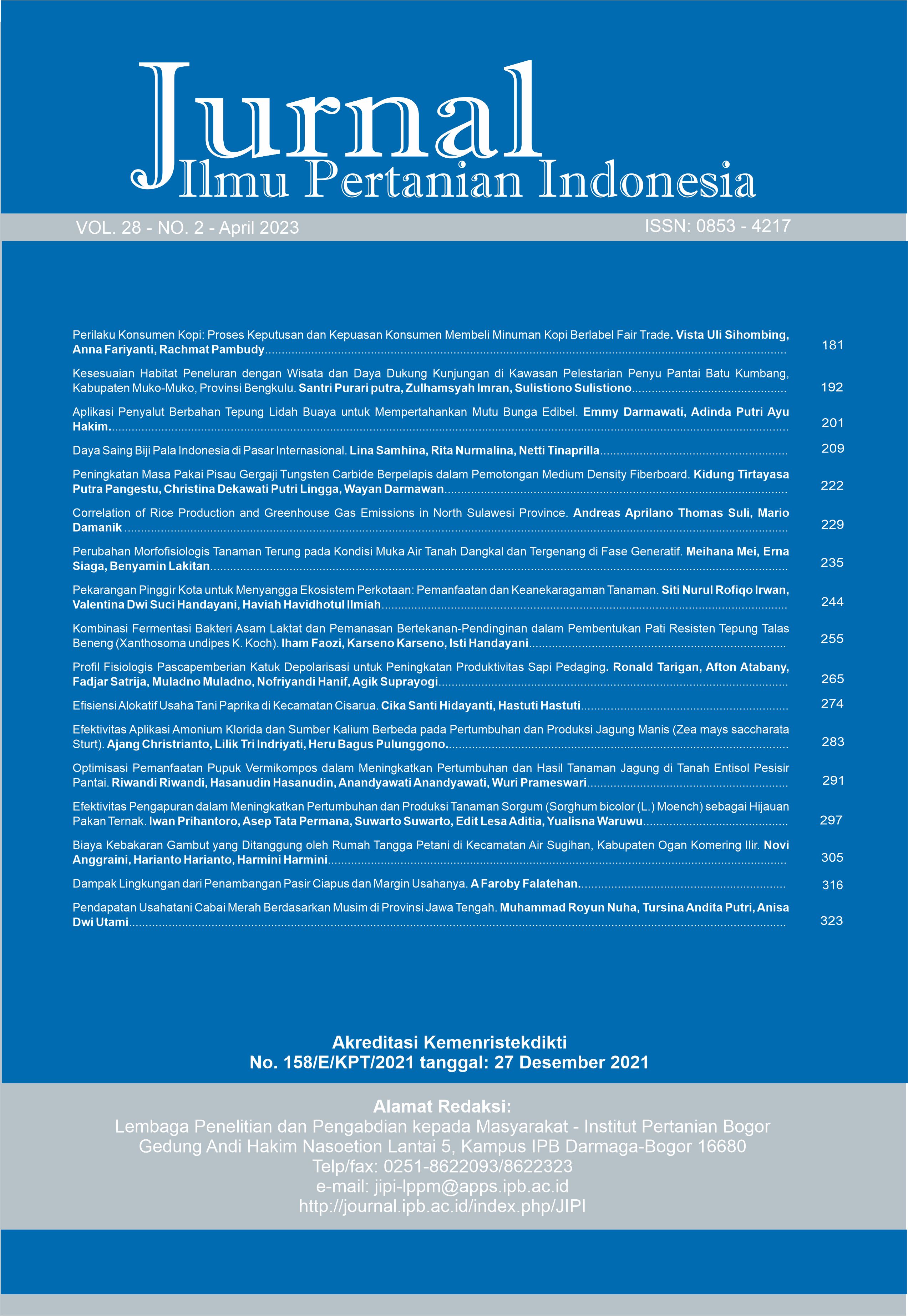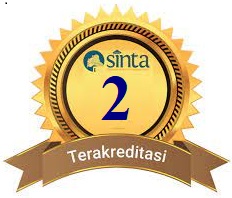Peningkatan Masa Pakai Pisau Gergaji Tungsten Carbide Berpelapis dalam Pemotongan Medium Density Fiberboard
Abstract
The scarcity and high cost of high-quality sawn timber has resulted in the switching of furniture industry to using composite wood such as medium density fiberboard (MDF) as the raw material for its products. One of the factors that affect production costs and product quality in the furniture industry is the quality of the cutting tool used in the cutting operation. The quality of the cutting tool could be improved through the addition of coatings on the surface of cutting tool (surface coating). The purpose of this study was to determine the life time of AlCrN, TiAlN, and TiN coated tungsten carbide (TC) tools in cutting MDF. Cutting operations were performed on a computer numerical control (CNC) router machine at feed per revolution (Frev) of 0,10, 0,15, 0,20, and 0,30 mm/rev. The TC cutting tool life was determined based on its wear and was calculated using the Taylor tool life formula. The results showed that coated TC cutting tool provided a better wear resistance and longer life than uncoated TC cutting tool. The low of Frev set in cutting MDF resulted in a lower wear and longer life of cutting tool. AlCrN coated TC cutting tool provided the best wear resistance and longest life, thus it promising to be developed and used in cutting MDF.
Keywords: coated cutting tool, medium density fiberboard, surface coating, tool life, wear
Downloads
References
Bagnall C, Capo J, Moorhead WJ. 2018. Oxidation behavior of tungsten carbide-6% cobalt cemented carbide. Metallography, Microstructure, and Analysis. 7: 661–679. https://doi.org/10.1007/s13632-018-0493-7
Brenner D, Kleinert F, Imiela J, Westkämper E. 2017. Life cycle management of cutting tools: Comprehensive acquisition and aggregation of tool life data. Procedia CIRP. 61: 311–316. https://doi.org/10.1016/j.procir. 2016.11.168
Chandrashekhar A, Kabadi VR, Bhide R. 2016. Scratch wear resistance of TiAlN and AlCrN coated EN-353 steel. Journal of Material Sciences & Engineering. 5(4): 251. https://doi.org/10.4172/2169-0022.1000 251
Chladil J, Sedlák J, Rybářová ER, Kučera M, Dado M. 2019. Cutting conditions and tool wear when machining wood-based materials. BioRes. 14(2): 3495–3505. https://doi.org/10.15376/biores.14. 2.3495-3505
Chuangwen X, Jianming D, Yuzhen C, Huaiyuan L, Zhicheng S, Jing X. 2018. The relationships between cutting parameters, tool wear, cutting force and vibration. Advances in Mechanical Engineering. 10(1): 1–14. https://doi.org/10.1177/168781401 7750434
Darmawan W, Rahayu IS, Nandika D, Marchal R. 2012. The importance of extractives and abrasives in wood materials on the wearing of cutting tools. BioRes. 7(4): 4715–4729. https://doi.org/10.15376/biores.7. 4.4715-4729
Darmawan W, Usuki H. Rahayu IS, Gottlober C, Marchal R. 2010. Wear characteristics of multilayer-coated cutting tools when milling particleboard. Forest Products Journal. 60(7/8): 615–621. https://doi.org/ 10.13073/0015-7473-60.7.615
Darmawan W. 2017. Cutting Tool Edge Engineering for Echo-Macining of Wood. Bogor (ID): IPB Press.
Fahrussiam F, Darmawan W, Wahyudi I, Usuki H, Yoshinobu M, Koseki S. 2015. Karakteristik aus mata pisau terlapisi bahan pengeras pada pemotongan kayu mersawa dan papan partikel. Jurnal Ilmu Pertanian Indonesia. 20(3): 223–228. https://doi.org/ 10.18343/jipi.20.3.223
Greczynski G, Bakhit B, Hultman L, Odén M. 2020. High Si content TiSiN films with superior oxidation resistance. Surface and Coatings Technology. 398. https://doi.org/10.1016/j.surfcoat.2020.126087
Guimarães BMP, da Silva Fernandes CM, Amaral de Figueiredo D, Pereira da Silva FSC, Miranda MGM. 2022. Cutting suhue measurement and prediction in machining processes: comprehensive review and future perspectives. The International Journal of Advanced Manufacturing Technology. 120: 2849–2878. https://doi.org/10.1007/s00170-022-08957-z
Hosseinkhani K, Ng EG. 2020. A unique methodology for tool life prediction in machining. Journal of Manufacturing and Materials Processing. 4(16): 1–19. https://doi.org/10.3390/jmmp4010016
Kumar TS, Prabu SB, Manivasagam G, Padmanabhan KA. 2014. Comparison of TiAlN, AlCrN, and AlCrN/TiAlN coatings for cutting-tool applications. International Journal of Minerals, Metallurgy and Materials. 21(8): 796–805. https://doi.org/10.1007/ s12613-014-0973-y
Li B. 2012. A review of tool wear estimation using theoretical analysis and numerical simulation technologies. International Journal of Refractory Metals and Hard Mater. 35: 143–151. https:// doi.org/10.1016/ j.ijrmhm.2012.05.006
Paiva JM, Fox-Rabinovich G, Junior EL, Pietro Stolf P, Ahmed YS, Martins MM, Bork C, Veldhuis S. 2018. Tribological and wear performance of nanocomposite PVD hard coatings deposited on aluminum die casting tool. Materials. 11:358. https://doi.org/ 10.3390/ma11030358
Pangestu KTP, Darmawan W, Nandika D, Wahyudi I, Dumasari L, Usuki H. 2019. Performance of coated tungsten carbide in milling composite boards. Wood Research. 66(4): 606–620. https://doi.org/10.37763/ wr.1336-4561/66.4.606620
Sulaiman S, Roshan A, Borazjani. 2014. Effect of cutting parameters on tool-chip interface suhue in an orthogonal turning process. Advanced Materials Research. 903: 21–26. https://doi.org/10.4028/www. scientific.net/AMR.903.21
Suresh R, Basavarajappa S, Gaitonde VN. 2015. Experimental studies on the performance of multilayer coated carbide tool in hard turning of high strength low alloy steel. Journal of Materials Research. 30(20): 3056–3064. https://doi.org/10.1557/jmr.2015.236
Vereschaka AA, Grigoriev SN, Sitnikov NN, Batako AD. 2017. Delamination and longitudinal cracking in multi-layered composite nano-structured coatings and their influence on cutting tool life. Wear. 390–391: 209–219. https://doi.org/10.1016/j.wear.2017.07.021
Yemul NN, Deshpande GR. 2021. Literature review on tool wear in turning operation of aluminium. Journal of Engineering and Technology. 8(2): 15–17.
This journal is published under the terms of the Creative Commons Attribution-NonCommercial 4.0 International License. Authors who publish with this journal agree to the following terms: Authors retain copyright and grant the journal right of first publication with the work simultaneously licensed under a Creative Commons Attribution-NonCommercial 4.0 International License. Attribution — You must give appropriate credit, provide a link to the license, and indicate if changes were made. You may do so in any reasonable manner, but not in any way that suggests the licensor endorses you or your use. NonCommercial — You may not use the material for commercial purposes.























